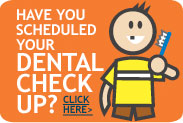Checkups at 2 Weeks
What Can Your Baby Do?
- She fixes on faces and follows movement. This shows that your baby can see.
- She responds to sound by startling, blinking, crying, or becoming quiet, although not with every loud sound. This shows that your baby can hear.
- Often by 1 month, she will smile in response to your voice.
- She sneezes and hiccups frequently.
- Your baby will not fight infection very well. Therefore, you should use a rectal thermometer if you suspect that your baby has fever. If you are not sure how to use one, our staff will be happy to show you.
- If the new mother will be returning to work, try to expose your baby to as few children as possible during child care, since this reduces her chances of infection.
- If your baby does develop fever in the first 6 weeks call your doctor right away, regardless of the time of day or night. Since your baby does not fight infection well at this age, he will need to be seen right away.
- She raises her head when lying on her tummy.
What Can Your Baby Eat?
- Your baby only needs breast milk or formula until she is several months old.
- You do not need to sterilize water to mix with her formula as long as your home has good city water. Try to feed your baby at least every 3 or 4 hours during the day so that she will sleep longer at night.
- You do not need to give your baby vitamins at this age.
- Do not give honey to your baby in the first year since it can cause infant botulism, a deadly disease.
- If your baby seems to have a lot of gas, simethicone (Mylicon) drops (3-6 drops every 4-6 hours) may help her.
- For hard stools or constipation, taking a rectal temperature with lots of Vaseline will help your baby pass his hard stool.
Blood Tests and Immunizations
- Your baby does not need any vaccines at this age.
- Your baby will have a blood test for anemia and his second PKU (Newborn Screen) taken from his heel during his checkup.
- The PKU or Newborn Screen checks your infant for several problems including phenylketonuria, low thyroid, adrenal abnormalities, and unusual blood types (sickle cell disease and others). The exact tests that are performed vary depending on the state.
Accident Prevention
- For the first several months, your baby should be placed on her back or side while sleeping to reduce her risk for Sudden Infant Death.
- Do not place pillows in the crib of your baby.
- Crib slats should be close enough together so that your baby cannot get her head between them since this can cause injury and death.
- Never leave your baby unattended where she can fall.
- Do not use chains, necklaces, or string around the neck of your baby since this can cause choking.
- Use a car restraint at all times with your baby and all other family members. Do not put her or other small children in the front seat of a car if it has airbags.
- Support the head of your baby when picking her up.
- Test the temperature of the bath water before bathing to avoid burns.
- Have at least 2 smoke detectors in your home.
- Do not let your infant sleep in your bed because you may hurt him accidently.
- For circumcised babies, routinely clean under his remaining foreskin. For uncircumcised babies, do not forcefully pull his foreskin back. It will usually retract naturally by 5 years of age.
Emotional and Social Development
- It does not hurt your baby to cry for a while.
- Your baby cannot be spoiled at this age no matter how much she is held.
- Babies like to be held and hear the voices of others.
- The first month is one of the most difficult months of childcare. It is natural for you to feel fatigued, overwhelmed, and even depressed.
- You should go out once a week without your baby; you will be a better parent if you have time for yourself and with your spouse occasionally.
- When you do go out, make sure the babysitter is a mature adult, not a young teenager.
- To develop effective parenting skills, it is important for parents to spend time together and discuss concerns about childcare.
- Share with your spouse what you liked and disliked about the way you were raised. How do you want child rearing to be different from the way you were raised?
Height ________ percentile ________
Weight ________ percentile ________
Head Circumference__________ percentile
________
The information contained within this website is no substitution for timely medical care.
Feel free to copy the information on this web
site and give to friends and family. Contact Dr. Glenn Wood
at Carousel Pediatrics (512) 744-6000
We are located at 7112
Ed Bluestein Blvd., #100 - Austin, TX 78723

